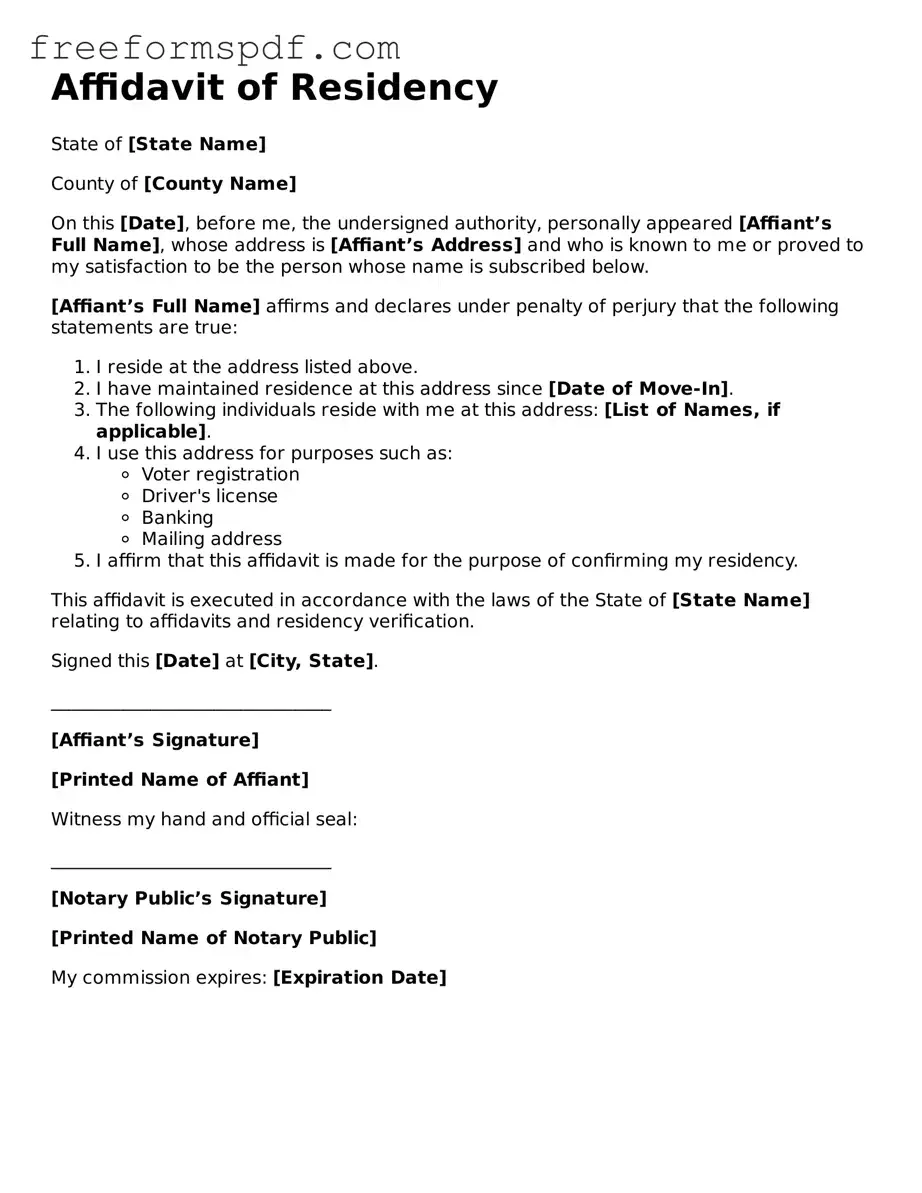Affidavit of Residency Document
Affidavit of Residency - Customized for Each State
Common mistakes
-
Inaccurate Personal Information: Many individuals fail to provide accurate details such as their full name, date of birth, or current address. This can lead to delays or rejection of the affidavit.
-
Missing Signatures: A common oversight is neglecting to sign the affidavit. Without a signature, the document is not valid, and the intended purpose cannot be fulfilled.
-
Incorrect Notarization: Some people forget to have the affidavit notarized or choose an unqualified notary. Notarization is essential for verifying the authenticity of the document.
-
Failure to Provide Supporting Documents: Individuals often overlook the requirement to attach necessary proof of residency, such as utility bills or lease agreements. This can undermine the affidavit's credibility.
-
Inconsistent Information: Providing conflicting information within the affidavit or between the affidavit and other documents can raise red flags. Consistency is key to ensuring acceptance.
-
Ignoring Instructions: Some people do not carefully read the instructions accompanying the affidavit. This can lead to incomplete forms or the omission of essential information.
Learn More on This Form
-
What is an Affidavit of Residency?
An Affidavit of Residency is a legal document used to confirm an individual's residence at a specific address. This form is often required for various purposes, such as enrolling a child in school, applying for certain government benefits, or verifying residency for legal proceedings. The affidavit typically includes the individual's name, the address in question, and a statement affirming that they reside at that location.
-
Who needs to complete an Affidavit of Residency?
Individuals who need to prove their residency may be required to complete this affidavit. Common scenarios include parents enrolling their children in school, individuals applying for housing assistance, or those needing to establish residency for legal matters. It is essential to ensure that the affidavit is completed accurately to avoid any potential issues.
-
How do I complete the Affidavit of Residency form?
To complete the Affidavit of Residency, begin by providing your personal information, including your full name and the address where you reside. Next, include a statement affirming your residency, which may require you to sign and date the document in the presence of a notary public. It is important to follow any specific instructions provided by the requesting agency or organization to ensure the affidavit meets their requirements.
-
Is notarization required for the Affidavit of Residency?
Yes, notarization is often required for the Affidavit of Residency. This process adds an extra layer of verification, ensuring that the information provided is accurate and that the individual signing the affidavit is indeed who they claim to be. It is advisable to check with the organization requesting the affidavit to confirm their specific requirements regarding notarization.
-
What should I do if I need to update my Affidavit of Residency?
If your residency status changes, it is important to update your Affidavit of Residency promptly. To do this, you will need to complete a new affidavit with your updated information and have it notarized again. Be sure to inform any relevant agencies or organizations of the change to ensure your records remain accurate and up-to-date.
Misconceptions
The Affidavit of Residency form is often misunderstood. Here are four common misconceptions:
- Misconception 1: The Affidavit of Residency is only for students.
- Misconception 2: The form must be notarized.
- Misconception 3: Anyone can fill out the form without consequences.
- Misconception 4: The form is a permanent record.
Many believe this form is solely for students needing to prove their residency for school enrollment. However, it can also be used by individuals in various situations, such as applying for government assistance or verifying residency for legal purposes.
Some people think that notarization is a requirement for the Affidavit of Residency. While notarization can add credibility, it is not always necessary. Requirements may vary by jurisdiction, so it is important to check local regulations.
Filling out the form inaccurately or dishonestly can lead to serious consequences. Misrepresentation can result in legal penalties or loss of benefits. It is crucial to provide truthful information.
Many assume that once the Affidavit of Residency is submitted, it remains on file indefinitely. In reality, the duration of record retention can vary. Certain agencies may only keep the document for a limited time, depending on their policies.
Other Types of Affidavit of Residency Forms:
Affidavit of Support Letter - An affidavit letter of support serves as a personal testimony about a couple's genuine marriage.
For those looking to navigate the complexities of vehicle transactions, understanding the New York MV51 form is crucial. This certification document not only facilitates the sale or transfer of vehicles manufactured in 1972 or earlier, but also applies to non-titled vehicles, making it essential for private sales. To aid in your process, you may find resources on NY Templates that offer valuable templates and guidance for completing the necessary documentation.
